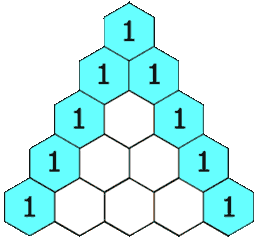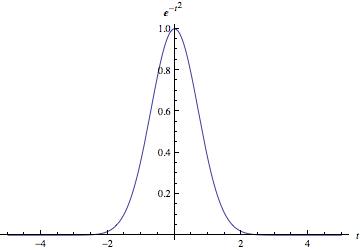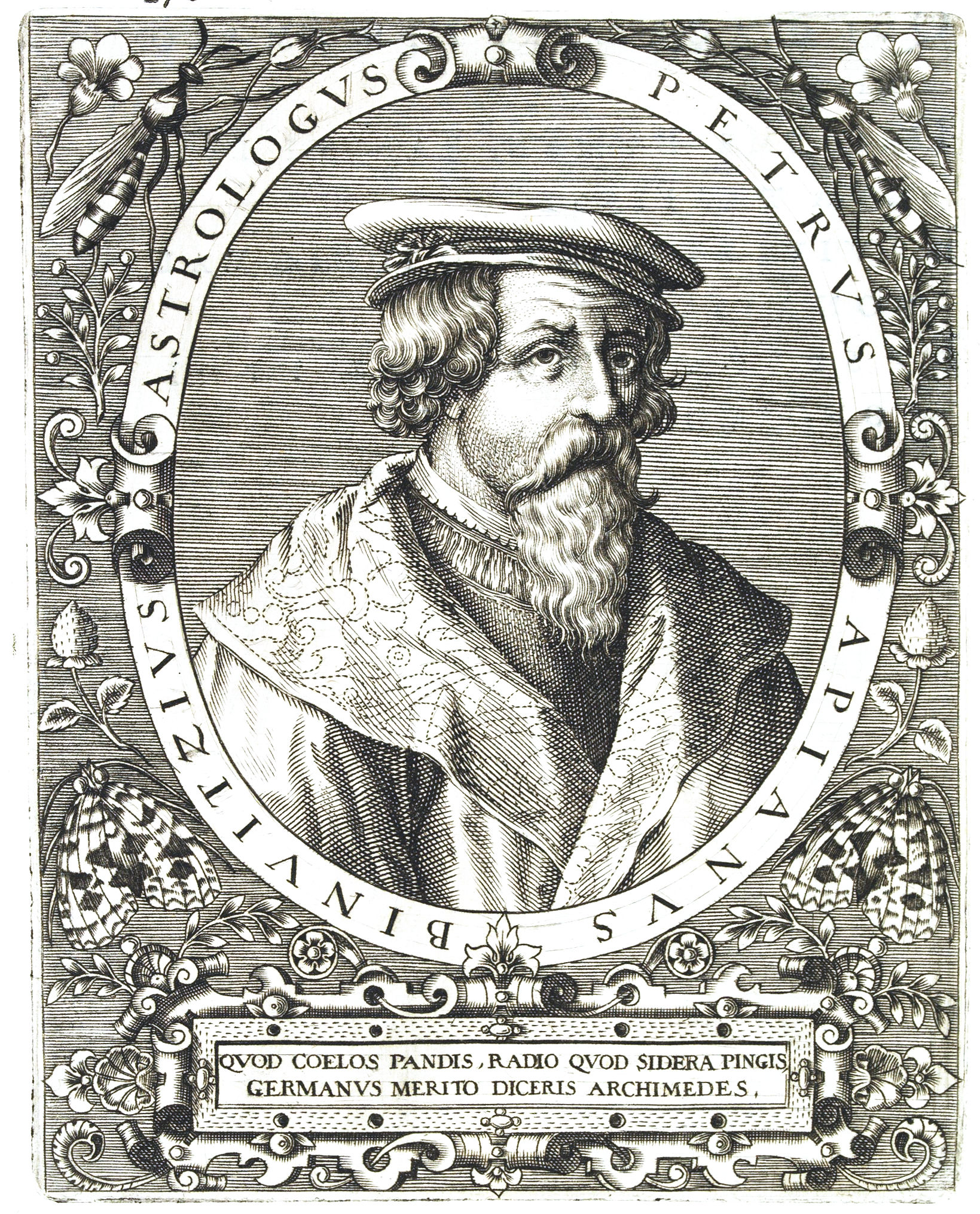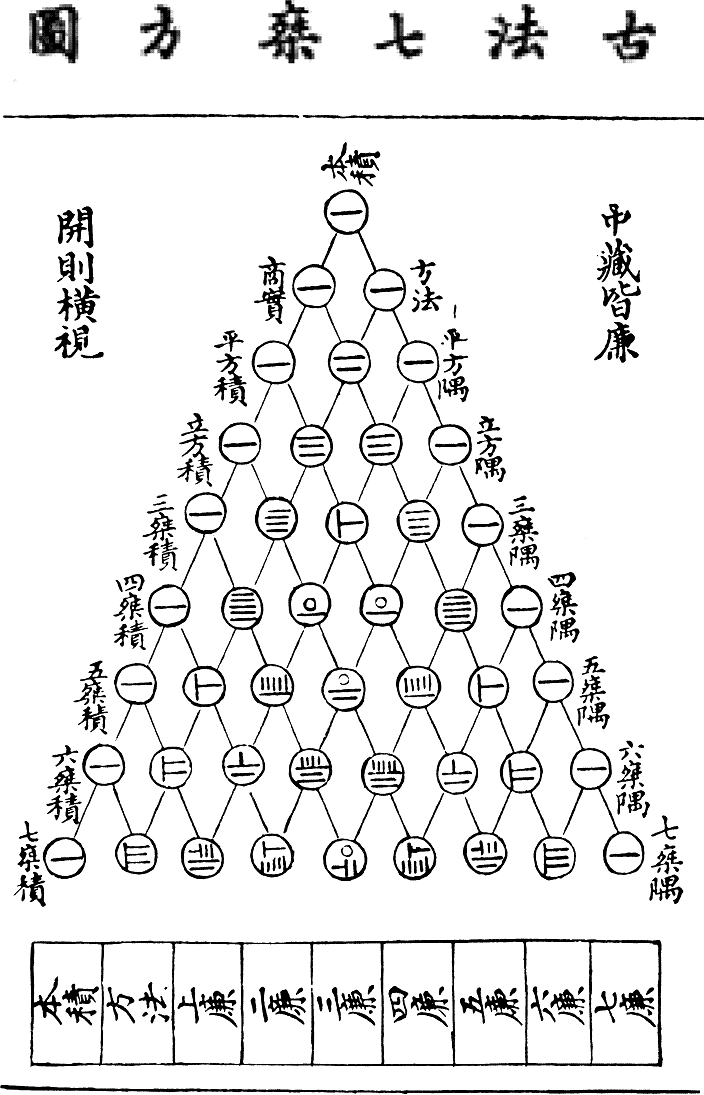|
Pascal's Triangle
In mathematics, Pascal's triangle is an infinite triangular array of the binomial coefficients which play a crucial role in probability theory, combinatorics, and algebra. In much of the Western world, it is named after the French mathematician Blaise Pascal, although other mathematicians studied it centuries before him in Persia, India, China, Germany, and Italy. The rows of Pascal's triangle are conventionally enumerated starting with row n = 0 at the top (the 0th row). The entries in each row are numbered from the left beginning with k = 0 and are usually staggered relative to the numbers in the adjacent rows. The triangle may be constructed in the following manner: In row 0 (the topmost row), there is a unique nonzero entry 1. Each entry of each subsequent row is constructed by adding the number above and to the left with the number above and to the right, treating blank entries as 0. For example, the initial number of row 1 (or any other row) is 1 (the sum of 0 and 1), whereas ... [...More Info...] [...Related Items...] OR: [Wikipedia] [Google] [Baidu] |
Mathematics
Mathematics is a field of study that discovers and organizes methods, Mathematical theory, theories and theorems that are developed and Mathematical proof, proved for the needs of empirical sciences and mathematics itself. There are many areas of mathematics, which include number theory (the study of numbers), algebra (the study of formulas and related structures), geometry (the study of shapes and spaces that contain them), Mathematical analysis, analysis (the study of continuous changes), and set theory (presently used as a foundation for all mathematics). Mathematics involves the description and manipulation of mathematical object, abstract objects that consist of either abstraction (mathematics), abstractions from nature orin modern mathematicspurely abstract entities that are stipulated to have certain properties, called axioms. Mathematics uses pure reason to proof (mathematics), prove properties of objects, a ''proof'' consisting of a succession of applications of in ... [...More Info...] [...Related Items...] OR: [Wikipedia] [Google] [Baidu] |
Binomial Theorem
In elementary algebra, the binomial theorem (or binomial expansion) describes the algebraic expansion of powers of a binomial. According to the theorem, the power expands into a polynomial with terms of the form , where the exponents and are nonnegative integers satisfying and the coefficient of each term is a specific positive integer depending on and . For example, for , (x+y)^4 = x^4 + 4 x^3y + 6 x^2 y^2 + 4 x y^3 + y^4. The coefficient in each term is known as the binomial coefficient or (the two have the same value). These coefficients for varying and can be arranged to form Pascal's triangle. These numbers also occur in combinatorics, where gives the number of different combinations (i.e. subsets) of elements that can be chosen from an -element set. Therefore is usually pronounced as " choose ". Statement According to the theorem, the expansion of any nonnegative integer power of the binomial is a sum of the form (x+y)^n = x^n y^0 + x^ y^1 + x^ y^ ... [...More Info...] [...Related Items...] OR: [Wikipedia] [Google] [Baidu] |
Probability Theory
Probability theory or probability calculus is the branch of mathematics concerned with probability. Although there are several different probability interpretations, probability theory treats the concept in a rigorous mathematical manner by expressing it through a set of axioms of probability, axioms. Typically these axioms formalise probability in terms of a probability space, which assigns a measure (mathematics), measure taking values between 0 and 1, termed the probability measure, to a set of outcomes called the sample space. Any specified subset of the sample space is called an event (probability theory), event. Central subjects in probability theory include discrete and continuous random variables, probability distributions, and stochastic processes (which provide mathematical abstractions of determinism, non-deterministic or uncertain processes or measured Quantity, quantities that may either be single occurrences or evolve over time in a random fashion). Although it is no ... [...More Info...] [...Related Items...] OR: [Wikipedia] [Google] [Baidu] |
Gerolamo Cardano
Gerolamo Cardano (; also Girolamo or Geronimo; ; ; 24 September 1501– 21 September 1576) was an Italian polymath whose interests and proficiencies ranged through those of mathematician, physician, biologist, physicist, chemist, astrologer, astronomer, philosopher, music theorist, writer, and gambler. He became one of the most influential mathematicians of the Renaissance and one of the key figures in the foundation of probability; he introduced the binomial coefficients and the binomial theorem in the Western world. He wrote more than 200 works on science. Cardano partially invented and described several mechanical devices including the combination lock, the gimbal consisting of three concentric rings allowing a supported compass or gyroscope to rotate freely, and the Cardan shaft with universal joints, which allows the transmission of rotary motion at various angles and is used in vehicles to this day. He made significant contributions to hypocycloids - published in ''De prop ... [...More Info...] [...Related Items...] OR: [Wikipedia] [Google] [Baidu] |
Nicolo Tartaglia
Nicolo, known as Tartaglia (; 1499/1500 – 13 December 1557), was an Italian mathematician, engineer (designing fortifications), a surveyor (of topography, seeking the best means of defense or offense) and a bookkeeper from the then Republic of Venice. He published many books, including the first Italian translations of Archimedes and Euclid, and an acclaimed compilation of mathematics. Tartaglia was the first to apply mathematics to the investigation of the paths of cannonballs, known as ballistics, in his ''Nova Scientia'' (''A New Science'', 1537); his work was later partially validated and partially superseded by Galileo's studies on falling bodies. He also published a treatise on retrieving sunken ships. Personal life Nicolo was born in Brescia, the son of Michele, a dispatch rider who travelled to neighbouring towns to deliver mail. In 1506, Michele was murdered by robbers, and Nicolo, his two siblings, and his mother were left impoverished. Nicolo experienced further ... [...More Info...] [...Related Items...] OR: [Wikipedia] [Google] [Baidu] |
Figurate Number
The term figurate number is used by different writers for members of different sets of numbers, generalizing from triangular numbers to different shapes (polygonal numbers) and different dimensions (polyhedral numbers). The ancient Greek mathematicians already considered triangular numbers, polygonal numbers, tetrahedral numbers, and pyramidal numbers, ReprintedG. E. Stechert & Co., 1934 and AMS Chelsea Publishing, 1944. and subsequent mathematicians have included other classes of these numbers including numbers defined from other types of polyhedra and from their analogs in other dimensions. Terminology Some kinds of figurate number were discussed in the 16th and 17th centuries under the name "figural number". In historical works about Greek mathematics the preferred term used to be ''figured number''. In a use going back to Jacob Bernoulli's Ars Conjectandi, the term ''figurate number'' is used for triangular numbers made up of successive integers, tetrahedral numbers made ... [...More Info...] [...Related Items...] OR: [Wikipedia] [Google] [Baidu] |
Michael Stifel
Michael Stifel or Styfel (1487 – April 19, 1567) was a German monk, Protestant reformer and mathematician. He was an Augustinians, Augustinian who became an early supporter of Martin Luther. He was later appointed professor of mathematics at Jena University. Life Stifel was born in Esslingen am Neckar in southern Germany. He joined the Order of Saint Augustine and was ordained a priest in 1511. Tensions in the abbey grew after he published the poem ''Von der Christförmigen, rechtgegründeten leer Doctoris Martini Luthers'' (1522, i.e. On the Christian, righteous doctrine of Doctor Martin Luther) and came into conflict with Thomas Murner. Stifel then left for Frankfurt, and soon went to Mansfeld, where he began his mathematical studies. In 1524, upon a recommendation by Luther, Stifel was called by the Jörger von Tollet, Jörger family to serve at their residence, w:de:Schloss Tollet, Tollet Castle in Tollet (close to Grieskirchen, Upper Austria). Due to the tense situation in ... [...More Info...] [...Related Items...] OR: [Wikipedia] [Google] [Baidu] |
Book Frontispiece
A frontispiece in books is a decorative or informative illustration facing a book's title page, usually on the left-hand, or verso, page opposite the right-hand, or recto page of a book. In some ancient editions or in modern luxury editions the frontispiece features thematic or allegory, allegorical elements, in others is the author's portrait that appears as the frontispiece. In medieval illuminated manuscripts, a presentation miniature showing the book or text being presented (by whom and to whom varies) was often used as a frontispiece. Etymology The word comes from the French language, French ''frontispice'', which derives from the late Latin ''frontispicium'', composed of the Latin ''frons'' ('forehead') and ''specere'' ('to look at'). It was synonymous with 'metoposcopy'. In English, it was originally used as an frontispiece (architecture), architectural term, referring to the decorative facade of a building. In the 17th century, in other languages as in Italian language, It ... [...More Info...] [...Related Items...] OR: [Wikipedia] [Google] [Baidu] |
Petrus Apianus
Petrus Apianus (April 16, 1495 – April 21, 1552), also known as Peter Apian, Peter Bennewitz, and Peter Bienewitz, was a German humanist, known for his works in mathematics, astronomy and cartography. His work on " cosmography", the field that dealt with the earth and its position in the universe, was presented in his most famous publications, ''Astronomicum Caesareum'' (1540) and ''Cosmographicus liber'' (1524). His books were extremely influential in his time, with the numerous editions in multiple languages being published until 1609. The lunar crater '' Apianus'' and asteroid 19139 Apian are named in his honour. Life and work Apianus was born as Peter Bienewitz (or Bennewitz) in Leisnig in Saxony; his father, Martin, was a shoemaker. The family was relatively well off, belonging to the middle-class citizenry of Leisnig. Apianus was educated at the Latin school in Rochlitz. From 1516–1519 he studied at the University of Leipzig; during this time, he Latinized his n ... [...More Info...] [...Related Items...] OR: [Wikipedia] [Google] [Baidu] |
Gersonides
Levi ben Gershon (1288 – 20 April 1344), better known by his Graecized name as Gersonides, or by his Latinized name Magister Leo Hebraeus, or in Hebrew by the abbreviation of first letters as ''RaLBaG'', was a medieval French Jewish philosopher, Talmudist, mathematician, physician and astronomer/astrologer. He was born at Bagnols in Languedoc, France. According to Abraham Zacuto and others, he was the son of Gerson ben Solomon Catalan. Biography As in the case of the other medieval Jewish philosophers, little is known of his life. His family had been distinguished for piety and exegetical skill in Talmud, but though he was known in the Jewish community by commentaries on certain books of the Bible, he never seems to have accepted any rabbinical post. It has been suggested that the uniqueness of his opinions may have put obstacles in the way of his advancement to a higher position or office. He is known to have been at Avignon and Orange during his life, and is believed to ha ... [...More Info...] [...Related Items...] OR: [Wikipedia] [Google] [Baidu] |
Jordanus De Nemore
Jordanus de Nemore (fl. 13th century), also known as Jordanus Nemorarius and Giordano of Nemi, was a thirteenth-century European mathematician and scientist. The literal translation of Jordanus de Nemore (Giordano of Nemi) would indicate that he was an Italian. Bertrand Gille, ''Les ingénieurs de la Renaissance''. He wrote treatises on at least 6 different important mathematical subjects: the science of weights; “algorismi” treatises on practical arithmetic; pure arithmetic; algebra; geometry; and stereographic projection. Most of these treatises exist in several versions or reworkings from the Middle Ages. We know nothing about him personally, other than the approximate date of his work. Life No biographical details are known about Jordanus de Nemore. Cited in the early manuscripts simply as “Jordanus”, he was later given the sobriquet of “de Nemore” (“of the Forest,” “Forester”) which does not add any firm biographical information. In the Renaissance his ... [...More Info...] [...Related Items...] OR: [Wikipedia] [Google] [Baidu] |
Yang Hui
Yang Hui (, ca. 1238–1298), courtesy name Qianguang (), was a Chinese mathematician and writer during the Song dynasty. Originally, from Qiantang (modern Hangzhou, Zhejiang), Yang worked on magic squares, magic circles and the binomial theorem, and is best known for his contribution of presenting Yang Hui's triangle. This triangle was the same as Pascal's triangle, discovered by Yang's predecessor Jia Xian. Yang was also a contemporary of Qin Jiushao, another well-known Chinese mathematician. Written work The earliest extant Chinese illustration of 'Pascal's triangle' is from Yang's book ''Xiángjiě Jiǔzhāng Suànfǎ '' () of 1261 AD, in which Yang acknowledged that his method of finding square roots and cubic roots using "Yang Hui's triangle" was invented by mathematician Jia XianNeedham, Volume 3, 134-137. who expounded it around 1100 AD, about 500 years before Pascal. His book (now lost), known as ''Rújī Shìsuǒ'' () or ''Piling-up Powers and Unlocking Coeffici ... [...More Info...] [...Related Items...] OR: [Wikipedia] [Google] [Baidu] |






